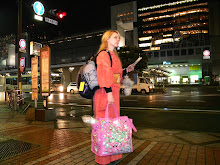In October, I reached the half-way mark in my savings for a backpacking trip around the world. It was also in October that my favorite cat,
Baci, was dying. He'd apparently been starving himself and his liver was severely damaged, but it wasn't until one Sunday night when he curled up next to me in a strange, almost-woozy manner that I noticed something was wrong. To rouse him, I poured some fresh cat food in his bowl. He wouldn't eat it. I scattered some treats in front of him, but he wouldn't eat those, either. When I broiled a salmon and placed it before him, he didn't even sniff the plate. He just laid his head in my lap and emitted a soft purr.
The vet confirmed my fears when I brought him to the animal hospital the following morning.
Baci was taken from me and hooked up to several intravenous tubes for hydration and medicine. It wasn't good, the
veterinarian told me. If he was still alive after a couple of days, they would need to perform an
esophagostomy. It was an expensive operation that, given his current condition, would give him a 50% chance of survival. He would also need to remain in the hospital, with staff
administering medicine and monitoring his health
periodically through both the day and the night. There were also referrals to another pet clinic, in order to properly diagnose the underlying root of the starvation
Baci had imposed on himself. All in all, it would cost 50% of the money I'd taken two years to save, and it would only give
Baci a 50% chance of living through it.
For those of you who are wondering the magic it takes to save $10,000 in two years when working for a very modest salary, I am divulging my money-making secrets right here: I worked. Incessantly. My jobs were all low-paying, but I had a variety of them, sometimes working as many as three jobs
simultaneously, which meant my typical work week (for the first year) was 60-80 hours. During the majority of that time period, my steady job was as an online editor of secret shopper surveys, which made it easy to incorporate a variety of alternate jobs into my schedule: scoring
standardized tests, selling bookbinding supplies, directing cars and selling
cooleroos at the Ann Arbor Art Fair, making beaded eyeglass holders at a rock shop, writing
recommendation letters and college entrance essays for rich-but-dumb students, and finally, purchasing and negotiating for a leading automotive company. In addition to my heavy work load, I lived like a poor person. I didn't go to movie theaters. I didn't buy new clothes. I didn't eat out in restaurants. Instead of buying a car, I either walked or rode the bus. The last job I held was in a different city from where I lived. After riding the bus 45 minutes to the closest stop, there were still two miles left between me and company headquarters. I'd ride my bike, The
Nevermind, or walk those last two miles. "What do you do when it rains?" a co-worker once asked. "I get wet," I replied, which served as both a punchline and the uncomfortable truth. After biking through one particularly vicious rain storm, I arrived at work so drenched and disheveled that I simply told people I'd swum over from the Titanic. Obviously, when so much hard work and sacrifice went into saving my money, it was not sensible for me to throw it away on a hopeless cause. And it wasn't just money, just savings in the bank; it was my dream. It was my ticket for traveling around the world.
When I adopted
Baci from a rescue group, he was only a few weeks old and so tiny he fit in the palm of my hand. At night, I'd fall asleep with
Baci at my feet, and in the morning, I'd wake up with him on my pillow. His
idiosyncrasies included a
predilection for keeping two catnip snakes, his favorite toys, in the food bowl. He was afraid of bubbles, the vacuum cleaner, and sometimes ants. Whenever I called for
Baci, he came. Sometimes he ran eagerly; sometimes he slunk forward in a sulky manner, but he always came to me, perhaps not realizing that, as a cat, he could have ignored me and still met status
quo. If I'd made a pros and cons list regarding whether or not to spend thousands of dollars on
Baci, I could have come up with a dozen reasons to put my cat to sleep and save my money. Even if I spent everything on him, there was only a half chance he'd be saved. There was only one reason I had to sacrifice my dream: I loved him. “Do whatever it takes,” I told the
veterinarian.
As a child, I was always trying to save creatures smaller than myself – birds that had fallen out of their nests, rabbits that had been ravaged by
neighborhood cats, a Canadian goose that was drowning, a puppy running down a busy highway. My mother always tells the story of how, as a toddler, I tried to save a cartoon animal falling off a cliff by running up to the TV and holding my hands against the screen. I'd essentially been training for an animal nursing marathon since I was a child.
Baci made it through the operation and stayed in the animal hospital a week longer, but he was still in danger. The only way he could receive nourishment and hydration was through his feeding tube and the
administration of
subcutaneous fluids. When I took him home, it was my job to feed him through the tube 6 times a day. Given the fact that my work and commute took about 10 hours of my day, and I needed to prepare the tubes before feeding
Baci – puree and heat the food, fill the syringes and tap out the air bubbles – it meant I had to feed him roughly every 2 ½ hours throughout the evening and entire night. Then I'd leave for work early in the morning and work through the day. My life was spent as though in a delirium. I was never fully awake and never fully asleep. This lasted over two months. It also included uncertainty and the fear of losing him. I would leave the room and be afraid to return, afraid of the silence, afraid that if his body was still, it meant he was no longer breathing.
Whenever I fed Baci, I'd lift his emaciated body onto my lap and sing to him, sweet little nonsense songs. And I'd pray for him, more than I've ever prayed for anything. I asked anyone I came across to also pray for him. Every breath
Baci took was a miracle, every mm of food his body accepted was a prayer answered. I explained my devotion to my cat by telling people I loved
Baci like he was my child. But that wasn't it, not really. I didn't love
Baci like a child or a best friend or a cat, though, at times, he filled all those positions. I simply loved him. I knew that, as far as he was capable,
Baci would have done anything for me. I owed him no less.
By the first of January, an auspicious new start to the year,
Baci ate entirely on his own. I stopped feeding him through the tube and almost a week later, the
veterinarian removed it. Provided
Baci takes daily medicine for his liver, the vet says he should now have the longevity of a normal cat. I feel blessed by this, and I've never regretted any of the sacrifices I'd made. But along with my joy at his recovery, a resigned melancholy set in place. I'd given up on my dreams. I no longer tried to scrimp and save my money for
rtw travel because it no longer seemed possible. All I'd previously denied, I now gave to myself in spades. I bought clothing with Labels and wore them to movies, concerts, and out-of-town dances. I hung out with friends and didn't calculate the cost beforehand. In some ways, it was the Fabulous Life. In another way, though, I knew I was spending money because I felt defeated. I'd worked so hard for my money and denied myself so much pleasure, and nearly half of it was gone in less than a month.
My epiphany arrived at work one day in the form of the company secretary. I have the suspicion my colleagues at work, which was, in all fairness, an automotive company, gossiped among themselves as to why I refused to buy or lease a car. “I'm saving my money,” was the only reason I would laconically offer. “I know why you're saving your money,” J. told me one day, leaning across my desk in a
conspiratorial manner. “You want to teach English abroad, right? You're saving up to move to Korea, where the teachers earn high salaries.” “No, that's not it,” I said. “I could do that right now if I wanted.” And then the heavens opened, a flock of doves descended, and a great,
transcendent,
incandescent light bulb lit directly above my head. “I can do that right now,” I repeated to myself in thought. And so, that's exactly what I'm doing. For the next year, I'll be experiencing the Korean lifestyle, food, and culture while saving the money necessary to continue traveling around the world.



